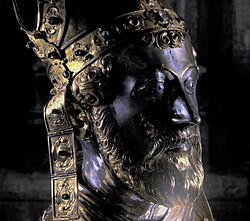Servatius of Tongeren
| Saint Servatius | |
|---|---|

Reliquary bust of Saint Servatius (15/16th c.)
|
|
| Born | Unknown Armenia (traditionally) |
| Died | 384 AD (traditionally) Maastricht |
| Venerated in |
Roman Catholic Church Eastern Orthodox Church |
| Major shrine | Basilica of Saint Servatius, Maastricht |
| Feast | 13 May |
| Attributes | So-called "Key of Saint Servatius", crozier, dragon (under his feet) |
| Patronage | Invoked against: foot troubles, lameness, rheumatism, rats and mice |
Saint Servatius (Dutch: Sint Servaas; French: Saint Servais, Armenian: Սուրբ Սերվատիոս) (born in Armenia, died in Maastricht, traditionally in 384) was bishop of Tongeren —Latin: Atuatuca Tungrorum, the capital of the Tungri—. Servatius is patron saint of the city of Maastricht and the towns of Schijndel and Grimbergen. He is one of the Ice Saints. His feast day is May 13.
A widely travelled diplomat and a determined prosecutor of Arianism, the presence of Servatius is recorded at several synods and church councils. In 343, Sarbatios - Greek texts rendering v as b - was present at the Council of Sardica (modern Sofia). In the debates, Servatius represented the Trinitarian view, which clashed with the Arian view of most Eastern bishops. When Athanasius, leader of the anti-Arian party, was in exile in Trier, he may have met with Servatius in Trier or Tongeren, because both men campaigned against Arian bishops and priests in the region. In 346, at the Council of Cologne, Servatius testified against the bishop of Cologne, saying that "he denied the divinity of Jesus Christ, this even happened in the presence of Athanasius, bishop of Alexandria", adding to this "our churches are adjacent".
...
Wikipedia
